Animal
Savant

- Joined
- Jun 26, 2015
- Messages
- 384
This is the first time I TRULY advocate for a dumbfuck tag, and would be massively dissapointed if it was not given.


This is the first time I TRULY advocate for a dumbfuck tag, and would be massively dissapointed if it was not given.
















Mass Effect Retrospective 14: Lord of the Retcons

Here is the final post on Mass Effect 1. And really, this post is more about the gap between the first and the second game. I know people rag on the ending of the third game, but for me the shift from ME1 to ME2 is where the entire world of Mass Effect fell apart. From there it was just a matter of waiting for the mistakes to take their toll.
So before we get into Mass Effect 2, let’s talk about the difficult work of connecting sequels by examining Lord of the Rings. Not because LotR is an unimpeachable work, but because it’s well-received, well-known, and we collectively have the befit of decades of hindsight[1].
Lord of the Rings
In the first book[2] the author presents an intractable problem: The Dark Lord is coming for his ring, and we can’t possibly hold off his armies. We can’t hide the ring, because it needs to be looked after to keep it from getting itself found by the enemy. We can’t hold onto the ring, because it will consume whoever holds it. And most of all we can’t USE the ring, because that would both hasten the corruption and act as a beacon for the enemy.
We can’t use it, hold it, hide it, or destroy it. This is quite a pickle we’re in, Mister Frodo!
Let’s imagine an alternate world where JRR Tolkien, for whatever reason, was unable or unwilling to continue Lord of the Rings beyond The Fellowship of the Ring. So the sequel is handed off to some different writer. Let’s call him George.
George looks back at Fellowship, skims the few notes Tolkien left for him, scratches his head, and comes up with his own version of The Two Towers: In it, Frodo meets another wizard named (say) Yandalf, who explains that no, Gandalf was wrong. The One Ring can totally be used to destroy Sauron, as long as the person wielding it is virtuous enough to resist corruption. Yandalf decides Frodo is worthy, so he teaches him to use the ring. Frodo gets all kinds of amazing super powers and raises an army. With the Ring he compels orcs to join his side, and when they join him they become nice[3].
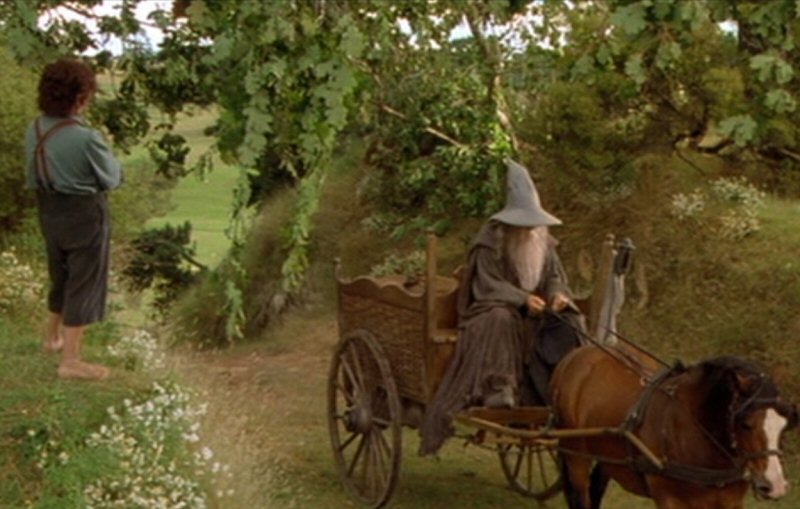
Along the way, Frodo needs to stay far enough on the side of virtue that the Ring won’t take control of him. He has to be an example of courage and diligence to the people of Middle-Earth. When a King loses his nerve and leads his forces away from the battlefield, Frodo humiliates him, rallies the fleeing men, and marches away with them, leaving the cowardly king alone. Frodo continues this way, drawing all men to his banner and stripping the undeserving of their power.
Frodo has to resist the advances of the smokin’ hot princess he meets, since That Would Be Wrong[4]. He has to resist the desire to take revenge on someone who betrays him and gets hundreds of his forces killed, because while it’s okay to slaughter thousands of people in battle as part of a war, it’s wrong to kill just this one dude outside of the battlefield. A king offers Frodo a whole bunch of gold to help fund his army, but Frodo has to turn it down because greed is bad and would corrupt him.
So at the end Frodo’s army of good orcs and nice humans beats the evil army of mean orcs and evil humans. Then Yandalf explains that Frodo has to keep the One Ring, just in case Saruon comes back yet again.
I know this sounds like a ridiculous plot in the context of Middle Earth, but I want to point out that this is all standard stuff. These are all tropes that have cropped up again and again in genre fiction, and they worked just fine in many other stories.
Plot Twist!
It doesn’t matter how well George justifies these changes. Yandalf can show up and yell, “Plot twist!” all he wants. George can contradict, explain, or lampshade as many alterations as he likes. It doesn’t matter. The problem with George’s story isn’t that he’s retconned some established facts of the setting. Even Tolkien himself – one of the most ambitious, skilled, and meticulous worldbuilders of the last century – had a few plot holes here and there. The problem with George’s story isn’t the re-write of lore, it’s that his story runs directly counter to the themes, ideas, tone, and sensibilities of the first book. It simply doesn’t fit as a continuation of what came before.
Fellowship presents a story where power is a perilous thing. Force is the tool of the enemy, yet force is needed to oppose the enemy, so how do we overcome him without losing ourselves and our values in the process? Even the wisest, most powerful, eons-old, most experienced champions of Middle Earth are afraid of what this power will do to them if they tried to use it. Tolkien had his heroes overcome this conundrum by pretending to meet force with force as Sauron would expect, but secretly sending someone small, gentle, and merciful into the realm of evil to destroy the ring forever. They literally overcame force with gentleness, and undid his power by refusing power. In the end, Sauron is undone because his foes (the good guys) did not desire power. This is a counterpoint to both he and his master Melkor, who basically created the concept of evil by desiring more power than had been allotted to him. This makes the ending of the story thematically complete, and serves as a vehicle for all sorts of ideas about the nature of power in this world.
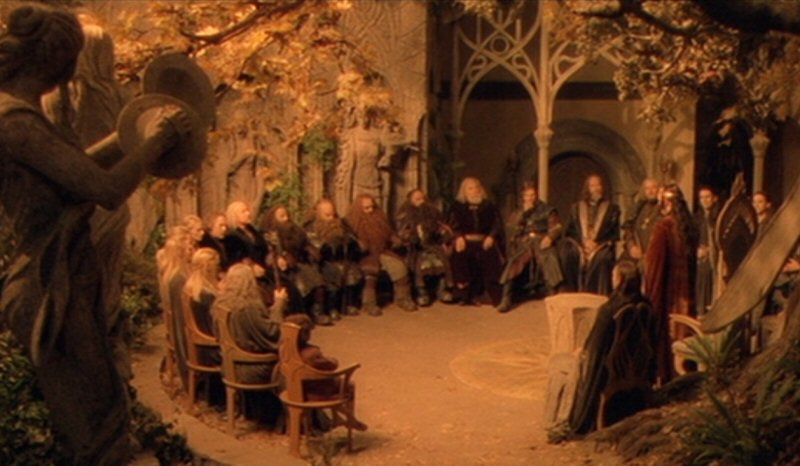
George’s story contradicts this by saying, “Actually power is awesome, as long as you’re the ‘right’ kind of person.” Fellowship began a journey to destroy the ring – to annihilate the most powerful thing in the world, but George dropped that story in favor of one about mastering power and using it responsibly. I want to be clear that these are both acceptable themes for a story. Taken alone, either one can make for a fantastic tale. But they are fundamentally incompatible. Taken together, Tolkien’s story and George’s story disagree with each other on a philosophical level, and trying to fit them together will inevitably tear the rest of the story apart.
In Fellowship, domineering power over others isn’t just a tool that evil uses, it is the very essence and nature of evil itself[5]. In Fellowship, Gandalf even refuses to take the Ring from Bilbo by force, even though allowing him to keep the ring is dangerous both to Bilbo himself and to all of Middle-Earth. Gandalf refuses to impose his good and wise will on a gentle Hobbit, even for the good of the Hobbit and for all of Middle-Earth. Instead Gandalf appeals to him as a friend, and Bilbo gives it up because of his deep friendship and trust. Lord of the Rings is deeply idealistic, down to its very bones.
In Fellowship, power over others is evil. In George’s story, power is just a tool, and it’s up to the good guys to grab power expressly for the purpose of denying power to the bad guys.
This change unravels important details in the first book: If the ring is indeed the key to winning the war, then Gandalf’s advice in the first book is WRONG, which makes him a bit of a cowardly screwup. Elrond’s fear of the ring is wrong. Galadriel’s refusal to take the ring is beyond stupid. Boromir’s attempt to take the ring at the end of the first book is no longer a tragic story of a man consumed by fear. It’s no longer an illustration of how the race of Men destroy themselves and the things they value because of their lust for power. Instead it turns out Boromir was right, and was just unlucky in getting killed instead of getting his hands on the ring. That is, the changes George made to the lore have retroactively changed the nature of characters and events in the first book.
Getting Back to Mass Effect
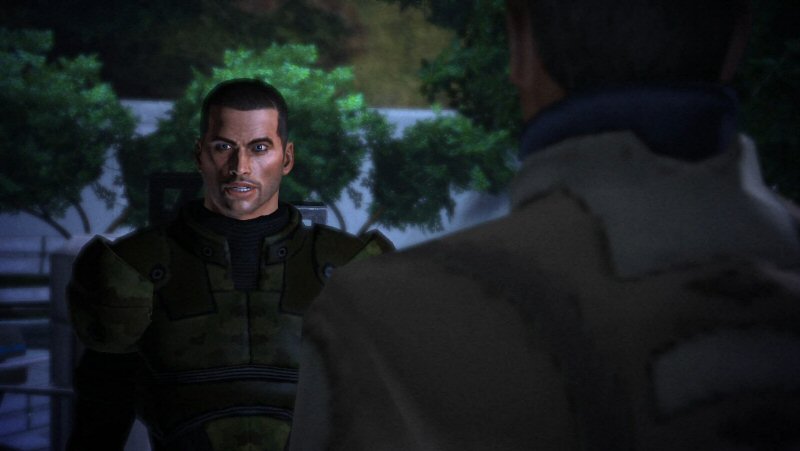
Like Fellowship of the Ring, Mass Effect 1 set a tone and pushed the story in a very particular direction. It created a quest for knowledge, and put our heroes into a position where they were the best people to go on that quest. Not in a “chosen one as decreed by the gods / fate” sort of way, but in a practical way that the events of the first game gave them tools that nobody else had. They were explorers, searching for answers. The plot called for them to go out into that great big universe of mystery and danger, and find out how to break the cycle of destruction forever. They weren’t going to win because of their guns and biotics. They just needed the guns and biotics to get to the answers that would make victory possible.
The writers not only failed to make use of these plot elements, they took every single aspect of this setup and smashed it to pieces. The council is retconned to not believing in the Reapers and not caring about the massive attack that nearly wiped out their government. Shepard loses both his status his Alliance and Spectre status. Liara goes away and forgets all about Prothean archaeology. Shepard’s ability to understand Prothean is no longer an asset to their mission. Shepard’s relationship with the council reverts to the pre-Ilos status quo. Shepard is no longer the protagonist because his team is uniquely qualified to learn about Reapers, but instead he’s the protagonist because of his fame and combat prowess. As Miranda says, “He’s a hero. A bloody icon”. Most importantly, Shepard is no longer an explorer on a quest to uncover a mystery, but a badass trying to rouse an apathetic galaxy to action[6].
Like making a story about Frodo mastering the One Ring and becoming a general, this argument isn’t really about “plot holes”, even though there are plenty of those. You can’t fix this story by adding cruft to the in-game codex or touching up a few lines of dialog. The problem is that this is a fundamentally different story. The first volume set a goal and got the story rolling in a particular direction, and the second volume performs a hairpin turn and goes off in a completely different direction before we reach the opening credits.
And even once we’ve accepted the hand-wavy justifications, this new story is dealing with new themes and different ideas. You could even argue we’ve changed genres. Mass Effect 1 and Mass Effect 2 feel about as different as Star Trek the Motion Picture and Star Trek: Into Darkness. Even if you enjoy them both and even though they both allegedly take place in the same universe and feature the same characters, they don’t have any connective tissue. Placed side-by-side, they don’t seem to be saying anything.
Themes Matter
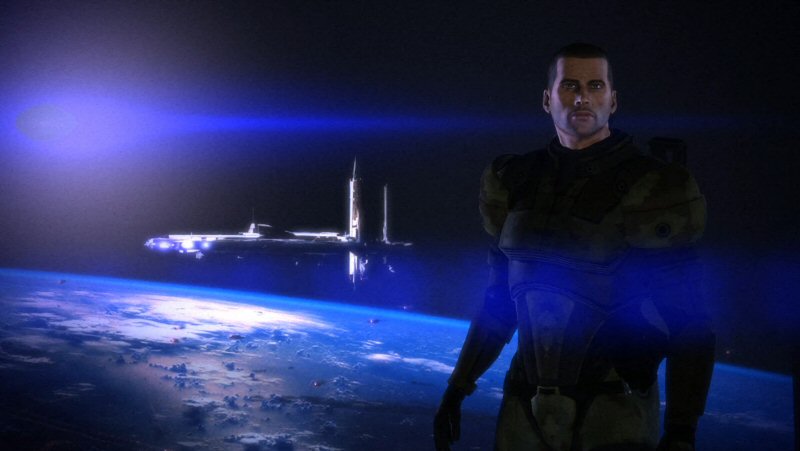
This is where fans will once again accuse me of nitpicking. This stuff about “themes and messages” strikes them as being horribly trivial. “Who cares? The game is still FUN isn’t it? Just enjoy the gameplay and hanging out with Mordin!”
It’s true that you can still enjoy a story with no coherent themes. But the point is that you can enjoy something even more when it has something to say. Lord of the Rings isn’t one of the most influential works of genre fiction in the English language because the public was clamoring for multi-page songs / poems that are barely germane to the plot. It wasn’t the elves, the rings, or the swords that made it so influential. It’s that fact that underneath all those trappings is a story with ideas that talk about big concepts like power, the nature of evil, the nature of a divine Creator, and the struggle to do what’s right when compromise seems so alluring. These ideas resonate with people and give the story a kind of potency that makes the work endure long after its most iconic elements have been pilfered, improved, and worn into clichés by the countless imitators that have followed.
No, Mass Effect doesn’t “need” to have profound themes to be a “good game”, whatever you mean by that. But it also didn’t need to spurn the first story. There was no reason – inside or outside of the world of Mass Effect – to sweep aside the groundwork laid by the first game. Even if you like the second game, it destroyed the first game just as surely as Frodo’s story of mastering the One Ring would destroy the tale begun in Fellowship of the Ring.
Themes matter. Tone matters. Something special was destroyed when the writer killed and resurrected Shepard as “a hero, a bloody icon”. Mass Effect 1 and Mass Effect 2 would bothbe stronger stories if we didn’t have to pretend one was a continuation of the other.

 took over. Never finished the third, and from the sounds of it that may have been the best decision I made in the game.
took over. Never finished the third, and from the sounds of it that may have been the best decision I made in the game.














my memories of that game were mostly related to the improved pew-pew combat, and the plot was more or less irrelevant and forgotten.















Mass Effect Retrospective 15: Change Happens

I don’t hate Mass Effect 2. It’s not a horrible game. I know people find this hard to believe, because I’ve spent so much time complaining about it. People look at the sheer volume of negative words I’ve put out and assume I’ve got this burning vendetta against the game, or that I think it’s the Worst Thing Ever.
Often when I do this sort of long-form analysis people will respond with “Why are you so angry?” and “Why did you write a book-length tirade about this?” I think this is a side-effect of the common “nerd rage” shtick that some critics do. People see something critical and they just assume it’s supposed to be performed in the voice of a spittle-spewing madman.
But if you look you’ll notice this series isn’t filled with outraged hyperbole, profanity, or personal attacks against the developer. I’m not making demands, claiming that I’ve been wronged, or accusing anyone of fraud. Yes, it’s negative, but it’s not outrage. If your mechanic tells you that your alternator is busted, he’s not saying you have THE WORST CAR EVER and that YOU ARE DUMB FOR OWNING IT. He’s just telling you why it doesn’t work.
That’s what this series is. We’re opening up the hood on Mass Effect 2 and finding things that don’t work.
I’m Not Even Angry
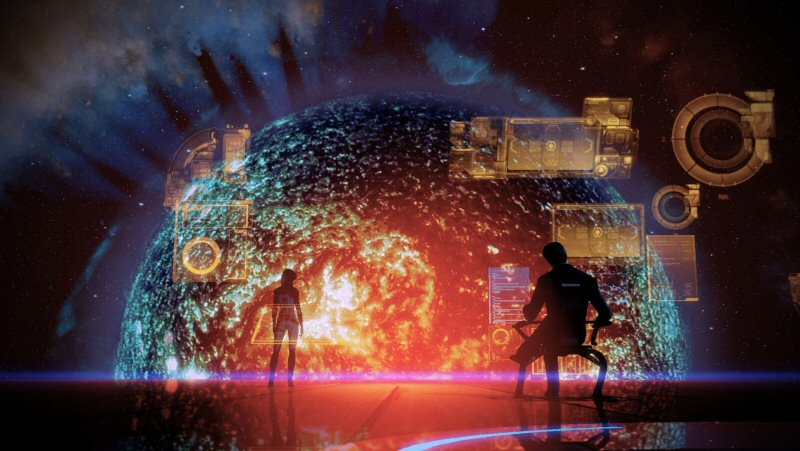
As I’ve said in the past few entries, even though Mass Effect 2 isn’t a horrible game, it’s also not the sequel suggested and prepared by Mass Effect 1. It’s tonally different. It’s thematically different. Important facts of the world and characters are changed, sometimes for poor reasons and sometimes for no discernible reason at all. This makes it incredibly frustrating for people who have spent a lot of time thinking about the first game. No matter how good Mass Effect 2 is, the fact that it tells this story means that we will never get the sequel we anticipated. The first game primed us and the main characters for a quest for knowledge and discovery that never took place.
This disconnect isn’t the result of a single flaw that we can point to and say, “This! This one thing shouldn’t have been changed!” Instead the old story died the death of a thousand paper cuts. Numerous things were altered, forgotten, shifted in importance, or abruptly added on. Just one of these changes would be a little annoying, but harmless over the long haul of the series. But when stacked together they create a rift that no retcon or hand-waving can overcome. This is not a continuation of the story I loved, and no amount of gameplay polish or Garrus fanservice can change that.
This is why these explanations are so damn long. People think I’m going through the story, searching for tiny, inconsequential things to gripe about because I enjoy nitpicking. And I do. But I’m going through this because all those “inconsequential things” compound until they kill my connection to the universe.
“[The Author] makes a Secondary World which your mind can enter. Inside it, what he relates is ‘true’: it accords with the laws of that world. You therefore believe it, while you are, as it were, inside. The moment disbelief arises, the spell is broken; the magic, or rather art, has failed. You are out in the Primary World again, looking at the abortive little Secondary World from the outside.”
J. R. R. Tolkien

This is quite an achievement. I really loved the world of Mass Effect 1. The world of Mass Effect 2 looks and sounds a lot like it, and a lot of my favorite characters are here. I wantto be in this world, having this adventure. But the unraveling of the story is so violent and the problems so far-reaching that all I can do is sit here in the Primary World and try to figure out where it all went wrong.
There’s a lot to unpack here. A bunch of established ideas change, the gameplay changes, and the tone changes, and so it’s difficult to know where to start. Since Mass Effect 2 puts the characters before the story, it makes sense to talk about the characters before we dissect the plot. On the other hand, it would feel strange to launch directly into talking about these recruitment missions without at least covering the setup that makes them necessary.
So let’s deal with the opening of the game and this new status quo, and then we can depart from the main story for a while and talk about all the other things. If nothing else, this will let us dilute the negativity a bit.
Wait, What?
The opening of Mass Effect 2 is tough for me to get through. Every line and every action rings false, awkward, contradictory, or just sophomoric. Jumping directly from the end of Mass Effect 1 to the opening of Mass Effect 2 is like jumping from Classic Trek to Abrams Trek. Trying to fit the two together is a thankless and infuriating task, and the writer seems bent on undermining your efforts at every turn.
The opening crawl is thus:

Right in the opening line the game claims that “Humans seized political control of the galaxy. That sounds kind of unreasonably abrupt and extreme. At the end of Mass Effect 1, the other races were “scared” and wanted Humanity to “step forward”. Saying Humans have “more power” would be reasonable. Claiming they have “political control” strikes me as extremely implausible. On top of that, the rest of the game undercuts this notion. Humans don’t seem to have any power at all, and can’t even spare resources to defend their vanishing colonies.
Either way, if the Humans lead (or control) the council, then why would they attempt to quell rumors of the Reapers? That’s the source of their political power. You could argue they’re trying to keep the people calm and hunt the Reapers in secret, but the very next scene reveals that to not be the case. That’s like a politician sweeping into office on a platform of demagoguing and threatening Elbonia, and then once they’re elected claiming that Elbonia isn’t and has never been a threat. Yes, you can contrive where such an outcome is possible, but it’s not the most intuitive and logical outcome of the previous events.
Everything feels slightly off-kilter like this. Nothing seems to flow naturally from the events of the first game, or even from the events of preceding paragraph.
We fade in on Miranda and TIM doing this idiotic circular discussion that boils down to: The council is making Shepard waste his time chasing Geth. The council won’t trust Cerberus, but they’ll follow Shepard. Because he’s “A hero, a bloody icon.”

So Cerberus wants to help Shepard, because humanity will follow Shepard. But they feel they need to help because… nobody is following Shepard? This becomes all the more nonsensical once you attempt to meet with the Council and they refuse to work with you (much less “follow” you) because you’re working for Cerberus.
These problems aren’t just “plot holes”. This is a premise that is inherently contradictory. This isn’t one part of a story disagreeing with another part of the story, this is each part of the story disagreeing with itself.
At the end of the conversation TIM says that Miranda needs to “Make sure [Shepard] doesn’t fail.” Okay. How were you going to accomplish that, exactly? What possible plan were you suggesting? Did you read ahead in the script and know that Shepard was going to die in the next scene and that you would need to resurrect him? If the Collectors hadn’t attacked and Shepard just kept flying around, what would Miranda have done? What help could she have offered? TIM eventually recruits Shepard to investigate the colony abductions, but at this point in time the abductions haven’t started yet. TIM is sending Miranda to help Shepard with a problem he doesn’t have yet so that TIM can recruit Shepard for a problem that doesn’t exist yet.
Basically, everything they say in this conversation is immediately invalidated by the next scene. Later they will follow through with the decisions made in this conversation, but for new reasons. That’s not really a plot hole, it’s just an incredibly muddled way to introduce the premise of the coming story.
And then we have the myriad of plot holes you get when you examine the scene retroactively, like why the supposedly clandestine collectors would brazenly attack the Normandy[1], or why they wouldn’t scoop up (or destroy) the escape pods after they won the battle, or why nobody in the Alliance or the Council follows-up and sends a force out here to find out what happened to their trillion-credit super-ship and their “Hero and bloody icon”. The dissonance is fractal, and trying to create headcanon to explain some of it will just open up holes elsewhere. Trying to follow the actions and motivations of the various sides is a fool’s errand.
We’re only five minutes in, and it feels like the writers are trying to plug a USB device into a light socket. This does not fit with the events and claims of the last game, it doesn’t fit with what comes later, and it doesn’t make enough sense to stand on its own. When you open up a game with ten minutes of non-branching expositional cutscenes there’s no excuse for it not holding together.
The Writer Flips The Table

Mass Effect 2 is merciless in its efforts to break free of the ideas and direction set by the first game. It feels like a sequel made by someone who actively loathed the original. This wasn’t just a quick retcon to change a few elements. The writer blew up the Normandy and killed the main character, ejected all of the squad members from the story, and then brought Shepard back to life and poofed the Normandy 2 into existence under new management.
As a result, we are asked to accept too many implausible, contrived, or dissonant ideas all at once, while at the same time relevant and reasonable questions aren’t even acknowledged, much less answered.
That’s just too many immersion-breaking questions in the first minutes of screen time. The writer is changing too much, too fast, and without giving their radical new ideas the proper build-up and support.
- The council isn’t just influenced by Humans, it’s “controlled” by them.
- And yet, the council STILL doesn’t believe Shepard about the Reapers, thus robbing the player of a portion of their victory from the last game.
- It turns out Cerberus isn’t clown college for super-villains, it’s actually a competent pro-human organization with spectacular power, reach, resources, and knowledge, rivaling that of most governments.
- Cerberus is led by this crazy, distinctive, infamous leader, who everyone knows about but who was never mentioned or hinted at in the last game.
- Shepard isn’t off looking for answers or knowledge like he promised in the closing line of Mass Effect 1, but instead flying around doing what seems like a waste of time.
- Where are the squad mates? Where is Garrus? Wrex? Tali? Hang on, are they on the Normandy? Did they just die? Where did they go?
- Shepard is suddenly dead at the hands of a new foe with zero buildup or foreshadowing.
- This new foe is a species which has apparently always existed in this universe and yet has never been mentioned.
- Shepard has been miraculously cured of death. Not just “Shepard’s heart stopped” but “complete and total brain death for a prolonged period of time, possibly even experiencing the effects of re-entry. (We’ll talk more about “re-entry” later.)
- Not only was Shepard cured of death, but the cure came from Cerberus.
- Cerberus is the only force interested in dealing with either the Reaper threat OR the collector threat[2], making them the only proactive force in the galaxy, and making every other power seem dumb or apathetic in contrast.
On top of all this, it doesn’t seem that this sledgehammer reset was needed. The main plot of the game consists of: Investigate collectors » gather team » fight collectors » gather more team » go through Omega-4 relay and fight collectors » end. You could do all of this in the context of a story where Shepard was still more or less working for the Council / Alliance. There would be no need to kill and revive Shepard, blow up and rebuild the Normandy, simultaneously introduce and retcon Cerberus, and explain the various crew changes. Sure, it might need a little retcon here and there to make it fit, but it would have needed fewer, less disruptive changes than this Cerberus plot.
Changes Require Planning, Not Brute Force

The larger the change you want to make to a story, the more care is required.
You can say that Darth Vader is Luke’s father during a climactic and emotional battle, after an entire movie of build-up and mystery about what Vader was doing and what his interest was in Luke. That same idea would have fallen flat if it had been part of a scene at the start of Empire Strikes Back where it’s revealed that Vader was Luke’s father, the Death Star wasn’t totally destroyed, Han is actually strong in the force, and Uncle Owen is still alive and working as an Imperial Spy.
As an author, you can’t change very many established facts without the risk of ejecting people back into the Primary World. But if you do need to change a lot of things, then don’t change them all at the same time. If you do need to change a lot of things at the same time, then at least wait until the audience settles into the familiar story before you upend everything. If you can’t wait until the audience settles in, then at least have the characters spend a good deal of time reacting to and reflecting on these incredible revelations. And if you can’t do that, at least make sure the changes all serve a purpose in the coming narrative, and aren’t just there for “style”.
Even if a revelation is possible under the established rules, if it’s a big deal then it needs to be given its own space. The audience needs time to absorb the new idea and the characters need to react to it. Nothing in Star Wars: A New Hope explicitly precluded Han Solo from using the force, but it would still have been ridiculous to introduce the idea of him being force-sensitive in the same scene where he starts throwing stuff around with his mind. Big ideas need time to grow and big revelations have to be earned. Having some kind of proportional character reactions wouldn’t hurt, either. Shepard’s reaction to his own death and resurrection gets fewer lines of dialog than (say) the totally optional “flavor text” conversations with the Volus ambassador in Mass Effect 1.
The opening of Mass Effect 2 whiffs on all of these. It changes too much, too fast, with too little reason or build-up, and it doesn’t have the characters adequately react to them. It flings you out of the story, and the more attached you were to the premise of Mass Effect 1, the more likely you’re going to have a problem with this new scenario.

RIGHT, it's Mass Effect 2 time.


Well, hes just getting it off his chest, as most people dont seem to understand what ME was and how it changed from 1 to 2.I don't usually classify things as being a waste of time, but what this guy's been doing, writing these retrospectives about ME of all things, truly can't be classified as anything else.
Edit2: And what made lawman Garrus turn into a vigilante? These aren't the people I remember.
Even the thought of buying another ME game fills me with anger and disgust.
Andromeda, the new ME series is being developed by an entirely different division of BioWare. Also Ian of Lazarus V fame is working on this as well.

Maybe. But I can't shake the impression that the author is a genuine ultra-autistic nerd who still (!) can't get over the fact that ME2 was great despite not being what he wanted it to be.It's just PR work for Andromeda.
ME2 was a fun cover based shooter. it had nothing else to offer.Maybe. But I can't shake the impression that the author is a genuine ultra-autistic nerd who still (!) can't get over the fact that ME2 was great despite not being what he wanted it to be.
I don't usually classify things as being a waste of time, but what this guy's been doing, writing these retrospectives about ME of all things, truly can't be classified as anything else.
ME2 was a fun cover based shooter. it had nothing else to offer.
The one that has you killing a human baby reaper by using the power of cover based shooting?I thought the story was half way decent...
In a comical way i guess it was, had they gone for a silly 80s vibe it would have been fitting.








